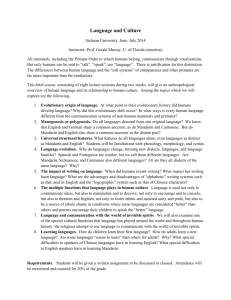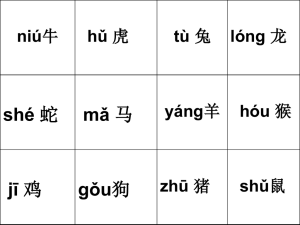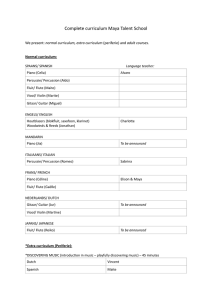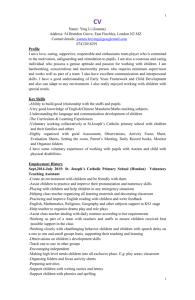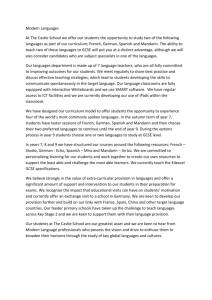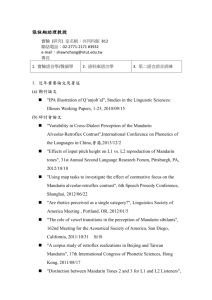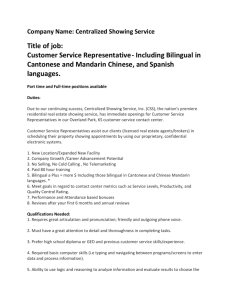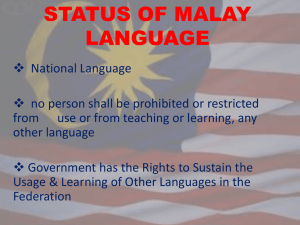1 Amanda, Berly, Wendy and Irene Ms. Yuan Yun
advertisement
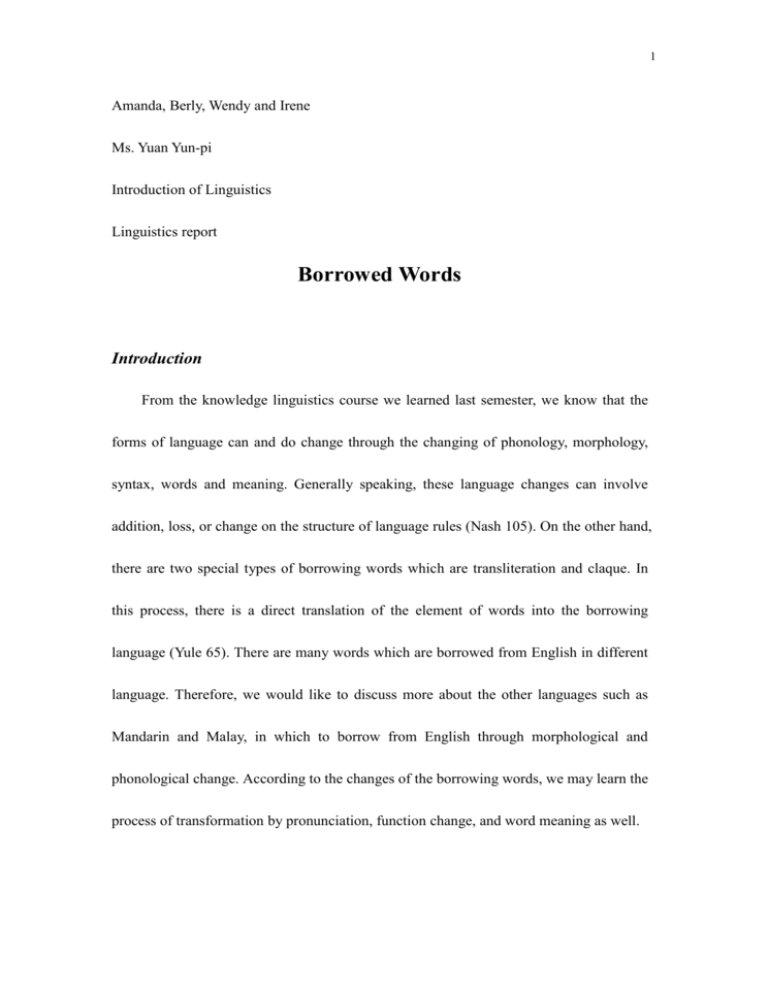
1 Amanda, Berly, Wendy and Irene Ms. Yuan Yun-pi Introduction of Linguistics Linguistics report Borrowed Words Introduction From the knowledge linguistics course we learned last semester, we know that the forms of language can and do change through the changing of phonology, morphology, syntax, words and meaning. Generally speaking, these language changes can involve addition, loss, or change on the structure of language rules (Nash 105). On the other hand, there are two special types of borrowing words which are transliteration and claque. In this process, there is a direct translation of the element of words into the borrowing language (Yule 65). There are many words which are borrowed from English in different language. Therefore, we would like to discuss more about the other languages such as Mandarin and Malay, in which to borrow from English through morphological and phonological change. According to the changes of the borrowing words, we may learn the process of transformation by pronunciation, function change, and word meaning as well. 2 Through knowing more about the principal and process of borrowing words, we can surely understand more about the change of language. Design: Seeing the instructions that we should investigate how words borrow from English in our life style, and how the language change as well. In our group, we decide to collect the data which in Malay from two of our group members, the rest of the data, we collect from the daily life conversation in Mandarin. We have enough data to discuss the different words in several languages which borrow from English by observing phonological change and morphological change. Finding and Discussion: We have tables to present the data that we have collected, and show our analysis of the borrowed words from English. I. Mandarin borrow from English Mandarin English Term of Borrowing 沙發 馬拉松 沙龍 土司 起司 ㄒ恤 比薩 Sofa Marathon Salon Toast Cheese T-shirt Pizza Transliteration " " " " " " 可樂 Coca-cola " 3 凡士林 香吉士 培根 巧克力 漢堡 血拼 伊媚兒 歇斯底里 蕾絲 Vaseline Sunkist Bacon Chocolate Hamburger Shopping E-mail Hysteria Lace " " " " " " " " " 樂透 酒吧 熱狗 超級市場 超人 雞尾酒 眼影 Lottery Bar Hot dog Supermarket Superman Cocktail Eye shadow " " Loan translation(calque) " " " " Analysis In Mandarin, there are quite a few words which borrow English words and lots of them are related to English culture which we can't find them in Chinese culture. In linguistic area, we divide borrowed words into transliteration and loan translation. Here, transliteration refers Mandarin translates or imitates the sound from English, and usually the meaning doesn't change, which means English and Mandarin share the same meaning of a certain word or character. Calque here means the sound of an English word is not borrowed by Mandarin but the meaning. As we can see from the column above, transliterations are far more than calques. However, there are some variations in transliterations. For instance, in English, “bar” means a counter at which drinks, especially alcoholic drinks, sometimes food is served. 4 “Bar” is a lexical morpheme which belongs to free morpheme in English, but it becomes a bound morpheme in Mandarin. It must be bounded to another character, such as “酒吧” and “吧台”. Another example of variations in transliteration we found is brand name and place name. A lot of brand names are transliterations as we list one example of “Coca-cola”. As for “marathon”, it refers to an item of sports, but it is also a place in Greece where the type of sports was developed. The other type of borrowed word is calque. The sound in English is not imitated by Mandarin character but only meaning. For example, “supermarket” in English translated into Mandarin “超級市場”. “Super” means to be higher than another in terms of rank, station or authority, so “超級” in Mandarin has the same meaning as English “super”. However, “super” in English can be a noun, adjective, or proposition, whereas in Mandarin, “超級” can only be an proposition or adjective. Chinese people don't say “超級” as a noun because it doesn't bring any meanings. Therefore, we can say “超級市 場” is a claque borrowed from English and has a derivational change (functional shift). Another interesting observation we found is "cocktail". “Cocktail” in English means any types of mixed alcoholic drinks. There is not such word “wine” or “alcohol” in this word. But in Mandarin, we translate it as “雞尾酒” because “雞尾” in Mandarin refers to a completely different thing, tail of a rooster. Therefore, it is a good example for us to see calque only borrow meanings. 5 II. Malay borrow from English Malay English Term of Borrowing Oren Nombor Coklat Beg Salun Eksperiment Orange Number Chocolate Bag Salon Experiment Transliteration " " " " " Televisyen komplek Television Complex " " Analysis Malay and English both use Roman alphabets to form their words and that is the reason why we separate Malay and Mandarin in different discussing sections. From the table above, we can know that most Malay borrows words from English we found are transliterations, which means Malay words borrow sound from English words and the meanings don't change, either. Most Malay words borrow English words in terms of phonological change such as oren, nombor, beg, and televisyen. That is because the spellings and the pronunciations of these words are quite similar to those of English words. Due to the same alphabetical writing, sometimes Malay borrowed words from English have very different spellings. For example, the Malay word “coklat” is borrowed from English word “chocolate”. Its pronunciation is similar to that of English word, but its spelling is quite distinctive from that of English word. 6 Conclusion Through our discussion of many borrowed words in Mandarin and Malay, we find that language changes involve culture integrations. Mandarin and Malay adopt and adapt many words from English, but the process would be somehow different. The process of words changes includes morphological change and phonological change. At the same times, different words functions also been changed through the process of borrowing as well. Therefore, we know that the process of change use of words not only involved morphological change and phonological changes but also related to different culture integrations. The various possibilities of changing the use of language make each language unique and alive.
